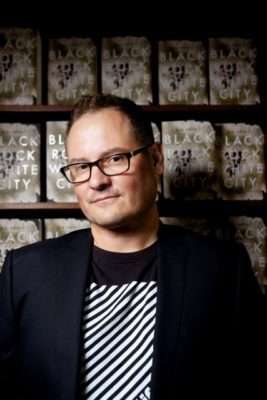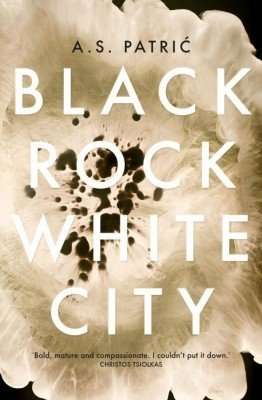Interview – A S Patric, author of Black Rock White City

Read in a single day, Black Rock White City exceeded my high expectations (read my 5 Star Review).
Today Australian author Alec Patrić joins us to discuss its path to publication, the recent Miles Franklin Award shortlisting, what he is currently working on and more…
UPDATE: Alec Patric, and his debut Black Rock White City went on to win the 2016 Miles Franklin Award (announced 26 August 2016).
BLBR: Firstly, congratulations on being shortlisted for the 2016 Miles Franklin Award. What does this kind recognition mean to you?
Alec: Thank you. The recognition that comes from being shortlisted for the Miles Franklin means Black Rock White City will continue to be read, at least for a few more months. All a writer really wants is readers. The words in a book are all dead things until a person brings their own life to the pages. Their breath stirs the embers in each sentence and then there’s light and warmth again. I used to think of this award only for the prestige it seemed to offer but now it’s as though one of our great cultural elders herself has emerged, and she has such an enduring presence she can breathe again and make entire books burn bright or explode into national consciousness. My book will flicker out of existence again, but this connection, and this moment, are extraordinarily lovely.
BLBR: Black Rock White City’s shortlisting has clearly begun translating commercially, with ‘new stock arriving soon’ recently appearing on various online retailer product pages — frustrating or gratifying? I do note that it remains in stock at Readings though.
Alec: There’s a reason why Readings was named best bookstore in the world at the recent London Book Fair. Well, much better reasons than this one, of course, but I’m happy that the delay in getting copies of my book to some online stores is because my novel has gone into its third print run. 95% of books (good and bad) disappear from the shelves of bookshops only months after release. I’m as much thrilled as I am simply relieved that my novel is still being bought a year after publication.
BLBR: As a reader, I found Black Rock White City deeply affecting… all consuming in parts. What was it like to live and breathe a story with such darkness over an extended period?
Alec: A novel as dark as Black Rock White City is in fact a release from darkness. It’s the nature of catharsis for both writer and reader. There’s a sense in art that the deeper we delve into pain, conflict, loss, etc, the clearer we see humanity—that the blackest places generate the most luminous insights. So yes, there were tears while writing this novel, but there was also much laughter. There’s a lot of humour in the book. And a lot of love. For all its tragedy this is a novel about what happens to a couple during a period of great disintegration, distortion and destruction—how love puts them back together despite the worst the world could throw at them.
BLBR: That this novel, from its title, language, character and plot, is imbued with symbolism leads me to ask, what input did you have into Transit Lounge’s stunning cover art? While I see an ethereal white flower with black stamen, I’ve also heard it likened to an inkblot.
Alec: It’s interesting to note that the image is called Failing the Rorschach Test because it’s practically impossible to pick it. Most people see a flower, perhaps an x-ray of a tulip. My favourite guesses are that it is burning paper and that it is a bomb at the moment of detonation. One book browser told me that she thought it was a jellyfish (?). Actually, it’s ink dripping into an aquarium and the photo is the moment when pigment diffuses into water. I came across the image years ago when I was drafting the novel. When we began talking covers, I put it forward as an option, and I was delighted that Transit Lounge decided to go with the image.

BLBR: Would you mind sharing with our booklovers, many of whom are aspiring writers, some of the more practical details about Black Rock White City’s road to publication – time spent on initial drafting, at what point you approached publishers, the feedback and revision process etc.?
Alec: Before Black Rock White City, I spent over seven years on a 175,000 word novel, which no publisher was willing to consider. It was heartbreaking to work for such a long time, with the purest dedication and faith, to find eventually that publishers had set such formidable fortifications against the possibility of even reading my manuscript. I began writing short stories in the hope that I might build a profile that would allow me to present the work I still cherished most. Literary journals not only read my stories, they published them. I fell in love with the short form and I was lucky enough to have two collections published.
Black Rock White City was a short story which after only a couple of pages insisted it was a novel, almost against my will (I was genuinely traumatised after my first novel). The first draft was quick, about 60,000 words, written in six months as though Black Rock White City was another short story. And yet I was always working on it, even when The Rattler & other stories was published in 2011 and Las Vegas for Vegans in 2012. And continuing to redraft and polish it when Bruno Kramzer, my novella, was published in 2013. The manuscript had grown only 20,000 words extra over the five years since that fast first draft but every word had been considered and re-considered a hundred times over. By the time Transit Lounge accepted it for publication all it needed was a light copyedit. All four of my published books are part of the same period that came after that first devastating failure. To this day, I believe (perhaps a delusion) that my first unconsidered novel, is my best work.
It’s been bittersweet reading Black Rock White City described as a ‘debut’ novel by some of the newspaper articles reporting the shortlist for the Miles Franklin. The advice to aspiring writers is that you keep writing no matter the setbacks—one piece of writing feeds into the next—keep evolving through your body of work.
BLBR: Prior to your novel debut, your work in the short form was recognised with short-listings for the Steele Rudd Award 2013 (Las Vegas for Vegans) and the 2013 Viva la Novella Competition (Bruno Kramzer). You’ve previously expressed the opinion that ‘short stories are read almost exclusively by other writers’. While not a writer, I certainly enjoy the short form and suggest that this may have begun to change as electronic publishing exposes the shorter form to a broader audience?
Alec: I’ve come to think that short stories and novellas are part of a different scene to the novel. There’s crossover of course, but the analogy I’d use now is that there’s theatre and there’s cinema. Both have many of the same principles of an audience and performance, but there are also fundamental differences in how they are received by the wider culture. Electronic publishing was not the introduction of sound to the era of silent films. It wasn’t even a change on the order of colour television. It’s more like 3D—an exciting yet ultimately gimmicky level of innovation. We’ve had over a decade to see that electronic publishing didn’t make a difference to how many people read short stories or novellas. It’s evident that the shorter forms might be suitable to the new platforms but the content is too challenging for the kind of reading preferred on screens. We don’t want to watch plays broadcast from the stage either. There are particular experiences that demand different mediums. Theatre doesn’t need to become cinema to justify its existence.
BLBR: It’s always interesting to hear what authors enjoy reading for pleasure. Can you share with us a recent favourite (story collection or novel)?
Alec: I recently read Billy Budd by Herman Melville. I wasn’t a fan of Melville’s work, and knowing Billy Budd was supposed to be a masterpiece, I began reading with a wary eye. There’s such density to the prose and the language is so baroque many paragraphs need to be read a number of times to tease out each nuance. There’s earnest intent intricately woven into every, single, sentence. It was written about a hundred years ago, but felt far older, more related in mood to Shakespeare, and in rhythm, to the King James Bible. All along the way I resisted the notion that this novella by Melville really was a masterpiece. Then I finished it and found that for weeks afterwards I could feel it growing in the back of my mind and I was forced to concede that Billy Budd really is an expression of literary art at its purest. I now think it’s a pristine artefact from an oceanic soul and want to read much more of Melville’s writing.
BLBR: Both ‘The Australian’ and ‘The Readings Monthly’ have called your next novel one of the most anticipated novels of 2016. What can readers expect when Atlantic Black is published by Transit Lounge later this year?
Alec: Hopefully they’ll amend that to one of the most anticipated novels of 2017 because while Transit Lounge was going to publish Atlantic Black later this year it’ll actually be released in the middle of next year (I haven’t finished drafting the new manuscript). Atlantic Black is a novel set on an ocean liner crossing from the Americas to Europe. The narrative takes place over one day and night—new year’s eve, 1938. The WWII fuse has been lit, and on the horizon, the world is about to explode. The RMS Aquitania steams across the Atlantic ocean. A seventeen-year-old girl called Katerina Klova is travelling with her mother. Atlantic Black begins with the collapse of Katerina’s mother, a complete psychotic break. It leaves Katerina alone for the first time in her life.
Get your copy of Black Rock White City from:
Readings | Booktopia | A&R Bookworld | Amazon | Kobobooks | Book Depository
Visit Alec’s website or connect with him on Twitter (@Rrrattler).
